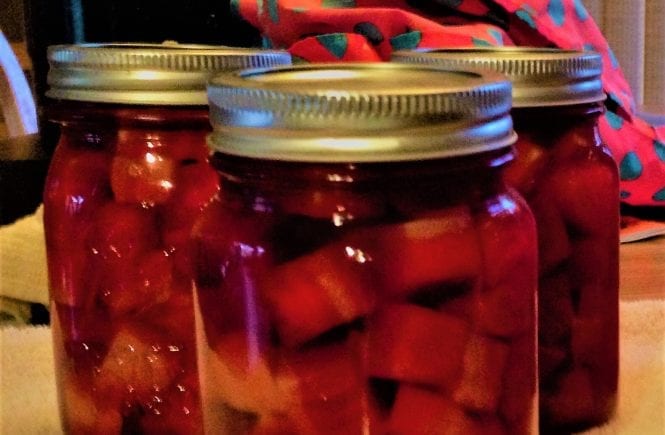I said I would never do it again.
I said that four years ago in September, when I’d spent the day canning over 50 pints of applesauce, peaches and tomatoes. That year I sought normalcy. I’d just finished with four rounds of chemo, and two months of five-times-a-week radiation for breast cancer, and I wanted so badly to feel about life the way I had the year before, and the year before that, and the year before that. When normal tests were the rule rather than the exception. The normal activity of canning, of food preservation would restore my faith and my belief in myself and my body. But that September, when the weather was hot, the canner extraordinarily heavy and the food prep kept me on my feet for too many hours, I reconsidered the effort. Even as I stood in my kitchen and admired the fruits of my labor (pun intended), I said I would never do it again.
And for four years, I didn’t. I did other things. I trained 800 miles to ride 200 miles on a bicycle during a blistering week of a midwest summer. I traveled with Rick to foreign countries that experienced the devastation of World War II, evidence of the unhealed scars tattooed across old stone buildings. Scars associated with the healing lay atop and below the manicured lawns ,of the Normandy American cemetery built to honor the small percent of U.S. men and women who died protecting those countries so far away and remained in this soil. We toured Costa Rica, whose dense rainforest is home to butterflies and birds of innumerable songs and colors, as well as oxygen that the rest of the world uses without a thought as to where it comes from.
In my homeland I traveled the highline of Montana and North Dakota, with their waves of endless wheat shimmering gold against a sapphire blue sky as the soft brown of the Milk River followed the ribbon of grey asphalt below a September sun. In the spring I wound my way through the small towns and canyons of Arizona, the saguaro cactus waving to me as I drove, their extended hands holding delicate blossoms of pink. I listened as American Indian high school students talked about their dreams, their vision of their future and their dawning perception as leaders within their community. And as I reflect on those moments, I am humbled by the gifts of their voices.
I also finished writing Bitterroot: A Salish Memoir of Transracial Adoption, followed it through the editing process, and cried when I held the 3-D object in my hand for the first time; a literary child born, the birthing pains nearly gone.
But this year, I sought normalcy as I return to ‘home,’, the sense of space that cradles my soul. Last spring, Rick and I started from scratch, to build my garden spaces to fill with flowers, with food, with butterflies, with beauty. We built thick, cedar garden beds, hauled in the dirt and raked it smooth. We dreamed the designs and character of our creations both material and botanical and were beyond excited when the first bits of greenery poked through the black soil. We had to replant three times through two killing frosts. The third time resulted in the much-anticipated vision of green and glorious foliage, complete with gentle but promising blossoms.
This past August we enjoyed tomatoes in our salads, as a side-dish, in our sauces, wherever we could fit them into our meals. I hadn’t planted cucumber until July, so we had only two, but they were better than anything I bought in the store. I harvested and froze zucchini for zucchini bread that I intend to bake in the middle of winter. And in spite of our recent snowstorm, two weeks ago, the fennel, collards and kale continue to thrive. My rosemary, thyme, and sage are going strong and I am trying to think of ways to preserve them. Hanging them to dry while they gather dust doesn’t appeal to me. I’ll worry about that tomorrow (I think in my Scarlet O’Hara voice.)
But as I pull the beets from their protective bunker, I am reminded that I still seek normalcy. So I ask my son to bring up the canning supplies from the downstairs shelves where they sat unused for four years, and I begin the comforting ritual of so many seasons passed. I prep the beets and watch as the water’s gentle boil turns from clear to claret red. I remove the skin and dice the fruit, spooning it into the hot washed jars that soon fill the bottom of the canner. As I lock the heavy lid into place, I feel the steadiness ritual provides: I look for the column of steam and watch as the rocking pressure knob counts out the seconds and minutes of processing time; I listen first for the gentle clink of glass against glass, and later the gentle ting of the vacuum-sealed lids And when I am done I am reminded how much control I still have of my life, of my world and my choices of how I will participate in both.
The sense of self-sufficiency and self-determination was nearly stolen by cancer. My garden returned it with only nine pints of beets. I will most likely continue the ritual next year, and the year after and the year after. My sense of normalcy, although now redefined, has returned.
